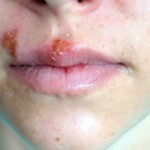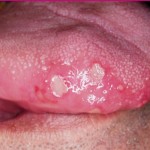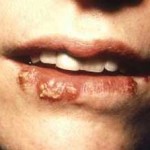When to Seek Medical Care
When to call the doctor
- Because the sores are painful, people may have difficulty eating or drinking. To prevent dehydration, people should call their doctor if they cannot eat or drink adequately.
- If any of these symptoms, which suggest dehydration, occur, medical care should be obtained:
- A decrease in urination (fewer wet diapers in infants)
- Drowsiness
- Irritability
- Dry mouth
- Notify a doctor if you are not sure what the oral sores are.
- If a child is younger than 6 weeks of age, notify a doctor if oral sores appear. Severe infection or disease complications occur more commonly in infants. For instance, besides affecting the mouth, HSV-1 may go to the brain and produce damage.
- People whose immune systems are weakened should also call their doctor if sores appear. If a person’s immune system is weakened, they are more likely to have severe infection or disease complications. Pregnant women need to consult immediately if HSV infection is noticed, especially if they are close to term.
When to go to the hospital
Signs and symptoms of dehydration usually warrant going to a hospital’s emergency department. Infants, especially under 6 weeks of age, should see their pediatric doctor or an emergency center if oral sores appear, or if the infant appears to slow urine output or decrease fluid intake.
Oral Herpes (HSV-1) Diagnosis
A doctor will base a presumptive diagnosis on information provided by the patient and on the physical examination. The characteristic appearance of the herpes sores leaves little doubt about the diagnosis. Further testing is usually not necessary.
If a definitive diagnosis is needed, because, for example, the infection involves other organ systems, the doctor may conduct laboratory tests listed below:
- A sample (tissue or fluid) from the sores to identify the virus as HSV
- A viral culture analysis
- A staining test called the Tzanck smear (shows nonspecific cell nucleus changes due to HSV)
- Antigen and antibody studies (serologic and PCR tests to determine if infection is caused by HSV-1 or HSV- 2)
Oral Herpes (HSV-1) Treatment
Self-Care at Home
- Use acetaminophen or ibuprofen (Excedrin, Ibuprin, Advil, Motrin) for fever and muscle aches. There is new data suggesting acetaminophen (Tylenol, Panadol) may be triggering asthma development in some children so parents should check with their child’s pediatric doctor before using over-the-counter drugs containing acetaminophen.
- Drink plenty of fluids to prevent dehydration.
- Avoid physical contact with the lesions and any lesion secretions.
Medical Treatment
Treatment includes medication for fever (see above) and taking plenty of fluids.
- A topical anesthetic such as viscous lidocaine (Dilocaine, Nervocaine, Xylocaine, Zilactin-L) may be prescribed to relieve pain associated with oral blisters and lesions.
- Oral or IV medication does exist for HSV but is not recommended for people with a normal immune system. It is used only for people with weakened immune systems, infants younger than 6 weeks of age, or people with severe disease.
- Some people may require hospital admission.
- Those with severe local infection
- People whose infection has spread to other organ systems
- People with weakened immune systems
- Dehydrated individuals who need IV hydration
- Infants younger than 6 weeks of age
Mild uncomplicated eruptions of herpes simplex require no treatment. Severe infection may require treatment with an antiviral agent. Oral antiviral drugs include
- acyclovir (Zovirax),
- valacyclovir (Valtrex),
- famciclovir (Famvir),
- and topical aciclovir or penciclovir (Denavir), (creams) may shorten attacks of recurrent HSV-1 if it is applied early, usually before lesions develop.
These drugs may stop viral replication in the skin but do not eliminate HSV from the body or prevent later outbreaks (HSV reactivation). These drugs are used more frequently with HSV-2 infections. Most investigators suggest consulting an infectious disease expert when HSV infected people need hospitalization.
Alternative medicine
Certain dietary supplements and alternative remedies are claimed to be beneficial in the treatment of herpes. There is however insufficient evidence to support use of many of these compounds including echinacea, eleuthero, L-lysine, zinc, bee products and aloe vera.
A single study indicates possible benefit from laser treatment.
Follow-up
Drink plenty of fluids.
- Use pain medications as instructed by the doctor.
- Use medications to control fever.
- Watch for signs and symptoms of dehydration.
- If any signs of dehydration develop, seek medical care immediately.
Oral Herpes (HSV-1) Prevention
 To reduce the chance of acquiring HSV-1, avoid touching saliva, skin, or mucous membranes of people who have HSV-1 lesions. Prevention of genital HSV may be accomplished by latex condoms, but protection is never 100%.
To reduce the chance of acquiring HSV-1, avoid touching saliva, skin, or mucous membranes of people who have HSV-1 lesions. Prevention of genital HSV may be accomplished by latex condoms, but protection is never 100%.
Oral Herpes (HSV-1) Prognosis
The sores and symptoms of oral herpes usually completely disappear in two to three weeks with no scarring. However, the sores may reappear under certain stressful situations. Rarely, some complications develop in a few individuals:
- atopic eczema,
- encephalitis,
- keratoconjunctivitis,
- pharyngitis,
- hepatitis,
- or herpes whitlow (HSV blisters or lesions on the finger(s).

